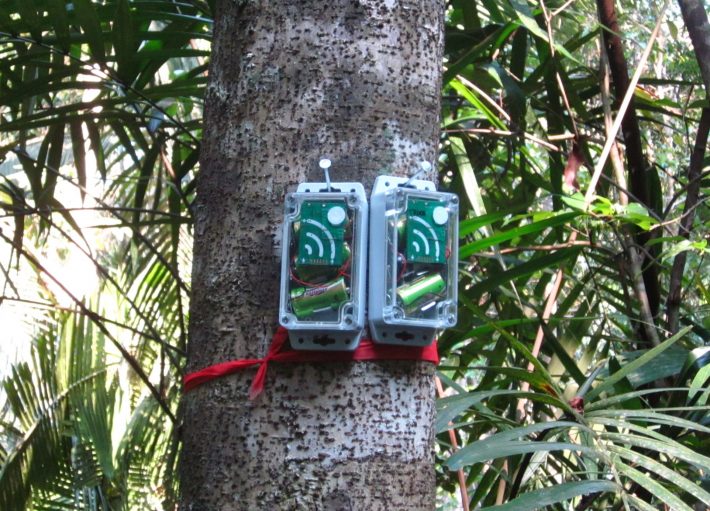Listening in: Acoustic monitoring devices detect illegal hunting and logging
Populations of large cats such as jaguars and pumas are in global decline due to habitat loss and indiscriminate hunting of them and their prey by humans. Newly developed acoustic loggers are able to record sounds of shotguns and chainsaws, shedding light on the frequency and patterns of illegal exploitation.
The results, presented today at the ‘Ecology Across Borders’ conference in Ghent, Belgium will help monitor biodiversity and reduce human-wildlife conflicts in tropical forests.

Aiding the conservation of big cats and their prey in Mexican tropical forests
Ecologists from the University of Southampton (UK) and Universidad Autónoma Metropolitana (Mexico) have been studying the presence and distribution of the elusive jaguar and puma in three contiguous regions of protected and unprotected forest in Mexico’s Yucatán Peninsula.
Camera traps and analysis of faeces revealed that jaguars and pumas prefer to prey on peccaries, deer and coati – species that are regularly hunted by local communities for their wild meat.
“Rural communities living near these nature reserves manage the natural resources in their communal lands, known as ejidos. Subsistence hunting of game meat and logging by residents is permitted in the ejidos, but there are no effective measures in place to regulate the hunting pressure”, says Evelyn Piña Covarrubias from the University of Southampton.
“Habitat fragmentation due to increased livestock production and reduced availability of their primary prey is a major threat to these big cats.
Also, they are frequently killed in retaliation for lost livestock or by poachers as there is still demand for the jaguars’ uniquely spotted coats.”
Today, an estimated 6,000 jaguars inhabit less than 40% of the area they used to in Mexico, whilst little information is available on puma populations due to difficulties in identifying individuals. Unlike jaguars, pumas do not have unique spot patterns.
Although two of the study sites are privately managed reserves, conservation efforts are often delayed by lack of data and insufficient budgets or personnel to detect and report illegal activities.
To this end, the researchers tested prototypes of ‘AudioMoth’, a low-power open-source acoustic monitoring device. The size of a matchbox and costing as little as US$43 per unit, the loggers can be configured to record sounds of human exploitation (shotguns and chainsaws) as well as target species in order to monitor biodiversity. The team’s findings are published today in the journal Methods in Ecology and Evolution.
The final product is being designed to transmit a real-time alert to park rangers with information about the type of sound and its location.
Evelyn Piña Covarrubias says: “Protected areas across the Yucatán Peninsula are far too under-resourced to afford effective and safe patrols of the vast tracts of natural forests. Most acoustic loggers on the market are too expensive for network deployments or have a short battery life.”
“With AudioMoth, local rangers and managers will have access to a monitoring system covering potentially large areas and can act immediately on alerts.”
The device has been developed by Andrew Hill and Peter Prince, two PhD students in computer science at the University of Southampton, in collaboration with Professor Alex Rogers from the University of Oxford.
Evelyn Piña Covarrubias will present her team’s work at the ‘Ecology across Borders’ annual meeting in Ghent on Thursday 14 December 2017.
This year’s conference is jointly organised by the British Ecological Society, Gesellschaft für Ökologie (the Ecological Society of Germany, Switzerland and Austria), and Dutch-Flemish Ecological Society (NecoV), in association with the European Ecological Federation, bringing together 1,500 ecologists from around 60 countries to discuss the latest advances in ecological research across the whole discipline.
Like what we stand for?
Support our mission and help develop the next generation of ecologists by donating to the British Ecological Society.